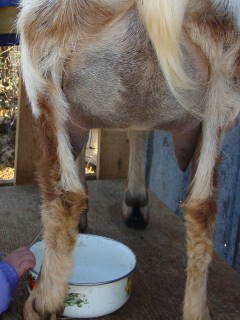Although goat milk, like cow milk and human milk, contains lactose, many people with lactose intolerance can drink goat milk. Why? It has been that the reason lies in goat milk’s “superior digestibility”. Goat milk can be broken down by the body in smaller pieces, thus making it easier to digest and absorb than cow’s milk. Undigested residue left behind in the colon is left to quite literally ferment and cause the uncomfortable symptoms of lactose intolerance.
Goats milk has casein curd, which is both softer and smaller than that produced by cows milk. The smaller and softer the curd, the more easily digestible by the human digestive system.
Another difference between cow’s milk and goat milk is found in the composition and structure of fat. The size of goat milk fat globules is about two micrometers, cows milk is to 2 1/2 to 3 1/2 micrometers. These smaller size provide a better dispersion making goat milk easier to digest.
Goats milk is an excellent option for a person who is cow milk sensitive. It is an excellent source of dietary calcium important in the prevention of high blood pressure, osteoporosis and other bone-related problems. For menopausal women, it provides 13% more calcium than cow’s milk and can be consumed comfortably even by those women with milk sensitivity.
It is an excellent choice for children who have problems digesting cow’s milk that have had to change to a vegetable protein soy-based milk. An estimated 20%-50% of children with cow milk protein intolerance will react adversely to soy proteins. Goat milk is a natural milk that children can consume comfortably, even if they are sensitive to cow’s milk and/or soy milk.
Goats milk is higher in evolved carotene (Pro-Vitamin A). Carotene has been found to have cancer preventing properties.
Goats milk contains 13% more calcium than cow’s milk, goat milk also has 25% more vitamin B-6, 47% more vitamin A, 134% more potassium and 350% more niacin. Goat milk is also higher in chloride, flourine, silicon, copper and manganese and contains 27% more of the essential nutrient selenium. Chloride and flourine and natural germicides, flourine assists in preventing diabetes. Goat milk contains none of the controversial Bovine Growth Hormone (BGH).

